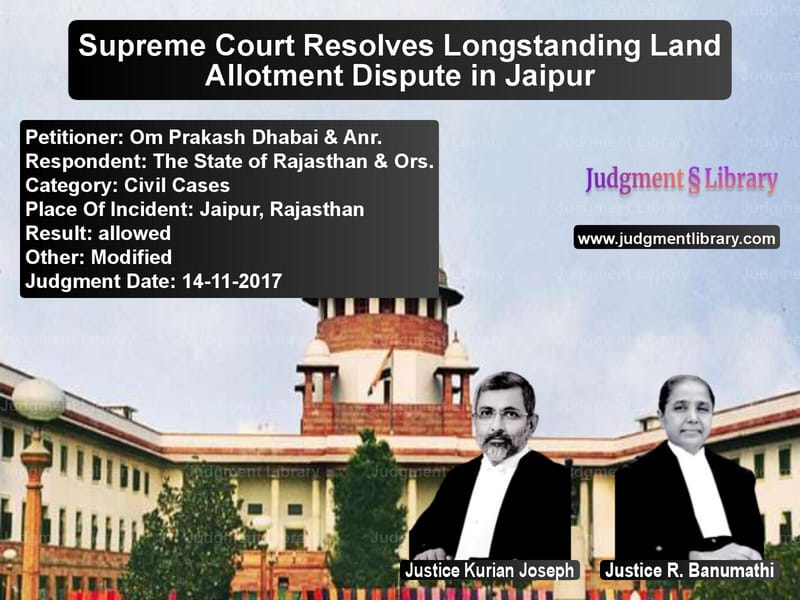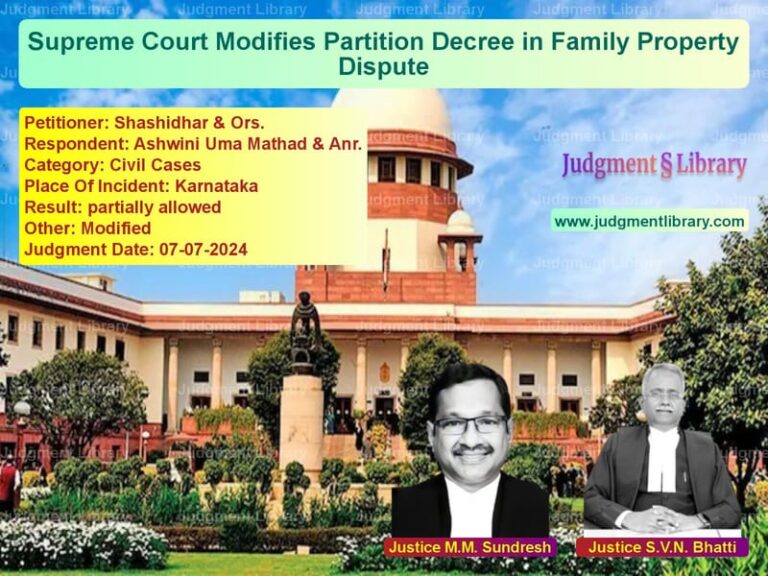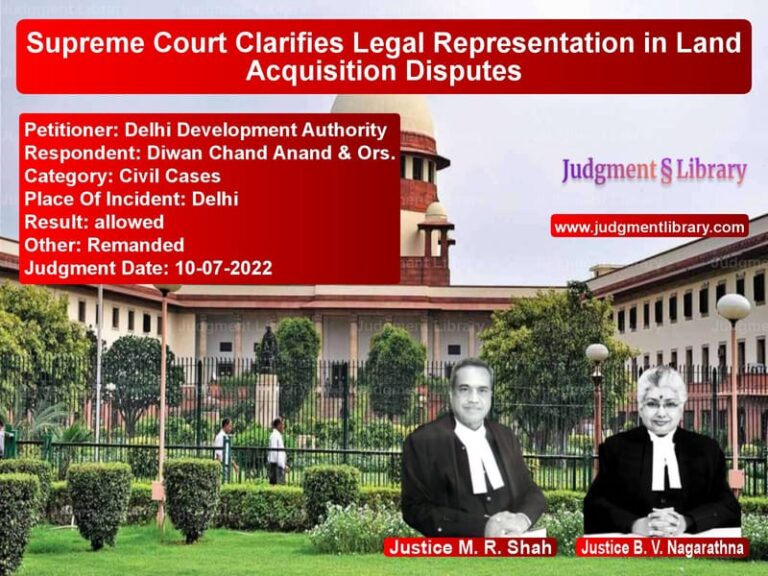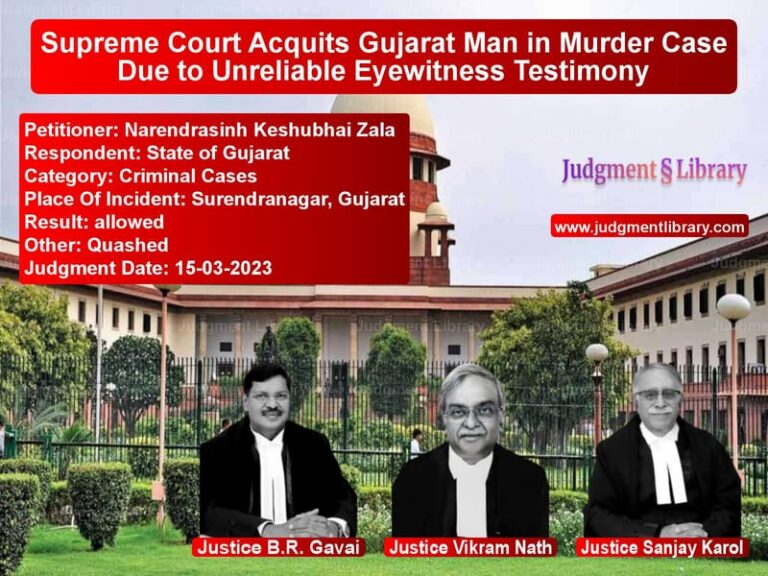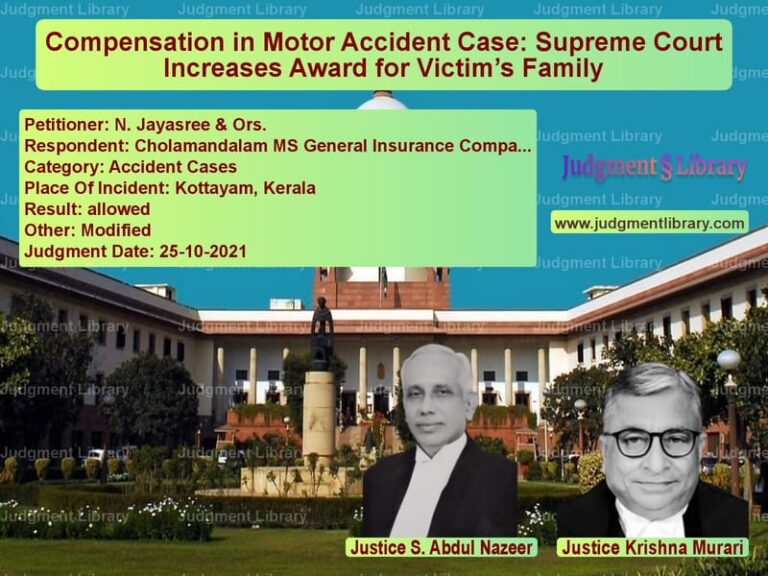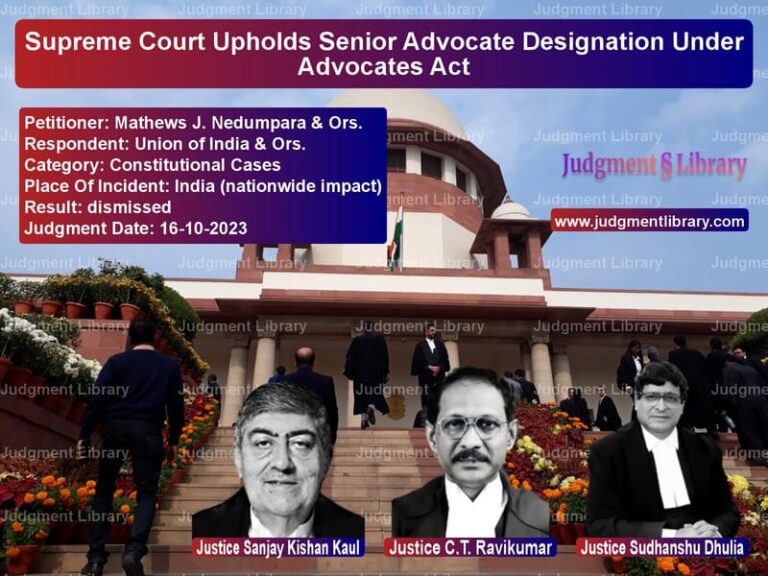Supreme Court Resolves Longstanding Land Allotment Dispute in Jaipur
The Supreme Court of India, in the case of Om Prakash Dhabai & Anr. vs. The State of Rajasthan & Ors., delivered a final ruling on a prolonged land allotment dispute in Jaipur. The judgment, which concluded years of litigation, upheld the conditional allotment of commercial shops to the appellants while recognizing the future implications of the city’s Master Plan.
Background of the Case
The dispute originated from a land allotment made through a letter dated May 6, 1997, issued by the Commissioner (Headquarters) of Jaipur Municipal Corporation. The appellants, Om Prakash Dhabai and another petitioner, sought to secure possession of commercial shops based on this allotment. However, the land in question was also marked for parking under the city’s Master Plan, leading to a prolonged legal battle.
As the case progressed, several legal issues were raised, including the right of the appellants to retain the allotted land and the enforceability of the original allotment order given the future implementation of the Master Plan.
Key Legal Issues
The Supreme Court examined the following key legal questions:
- Whether the appellants were entitled to the allotment of shops despite the area being earmarked for parking in the Master Plan.
- Whether the appellants should be evicted in the future if the Master Plan is implemented.
- Whether the conditions of allotment should be enforced based on the 1997 letter issued by Jaipur Municipal Corporation.
Petitioner’s Arguments
The appellants, represented by their legal counsel, argued that:
- They had a legitimate claim to the shops based on the original allotment order from 1997.
- There were vacant shops available in S-Block, which could be allotted to them without affecting the Master Plan.
- They were willing to accept the risk of eviction if the Master Plan was implemented in the future.
- The Jaipur Municipal Corporation should honor its commitment and allot the shops under the existing terms.
Respondent’s Arguments
The State of Rajasthan and Jaipur Municipal Corporation, represented by their counsel, contended that:
- The land was designated as a parking space under the Master Plan, and any allotment made in violation of the plan could be legally challenged.
- The appellants could not claim an absolute right over the land, given the city’s urban planning needs.
- The Master Plan’s implementation should not be compromised to accommodate individual allotments.
Supreme Court’s Observations
The Supreme Court, led by Justices Kurian Joseph and R. Banumathi, reviewed the facts and legal arguments and made the following key observations:
- The appellants had a valid allotment letter from 1997, which granted them rights to the shops in question.
- The appellants were willing to accept the risk of eviction if the Master Plan was enforced, which clarified their position and reduced any uncertainty regarding future claims.
- Jaipur Municipal Corporation could proceed with the allotment under the conditions stipulated in the original letter while maintaining the right to reclaim the land if necessary.
- Any charges applicable to similarly situated persons would also be levied on the appellants to ensure equitable treatment.
The Court stated:
“Learned counsel, on instruction, submits that the appellants are prepared to get the shops allotted at their risk, meaning thereby that as and when the Master Plan is implemented, they are liable to be evicted.”
Final Judgment
The Supreme Court ruled as follows:
- The appeal filed by Om Prakash Dhabai and another petitioner was allowed.
- The appellants were permitted to take possession of the allotted shops, subject to the risk of eviction if the Master Plan was implemented.
- The Jaipur Municipal Corporation was directed to allot the shops based on the original letter dated May 6, 1997.
- The appellants were required to pay the usual charges applicable to other similarly situated persons.
- All pending applications related to the case were disposed of.
- No orders were passed regarding costs.
Implications of the Judgment
The ruling has significant implications for land allotment disputes and urban planning:
1. Balance Between Individual Rights and Urban Planning
The judgment ensures that individual allotments are honored while allowing city planning authorities to enforce long-term development plans.
2. Conditional Allotments and Legal Risk
The ruling clarifies that allottees can accept conditional allotments at their own risk, meaning they may have to vacate the premises if urban plans require it.
3. Enforceability of Old Allotment Letters
The case sets a precedent for honoring old allotment orders, provided that the conditions of the allotment do not conflict with essential urban infrastructure projects.
4. Equitable Treatment in Land Allocation
The Court ensured that the appellants were not given special privileges and that they had to pay the same charges as others in similar situations.
Conclusion
The Supreme Court’s decision in Om Prakash Dhabai vs. The State of Rajasthan reaffirms the principle that land allotments must be honored while balancing broader urban planning concerns. By allowing the appellants to take possession of their shops while recognizing the potential risk of eviction, the Court provided a pragmatic solution that safeguards both individual rights and city planning priorities.
Don’t miss out on the full details! Download the complete judgment in PDF format below and gain valuable insights instantly!
Download Judgment: Om Prakash Dhabai & vs The State of Rajasth Supreme Court of India Judgment Dated 14-11-2017.pdf
Direct Downlaod Judgment: Direct downlaod this Judgment
See all petitions in Property Disputes
See all petitions in Landlord-Tenant Disputes
See all petitions in Specific Performance
See all petitions in Judgment by Kurian Joseph
See all petitions in Judgment by R. Banumathi
See all petitions in allowed
See all petitions in Modified
See all petitions in supreme court of India judgments November 2017
See all petitions in 2017 judgments
See all posts in Civil Cases Category
See all allowed petitions in Civil Cases Category
See all Dismissed petitions in Civil Cases Category
See all partially allowed petitions in Civil Cases Category

